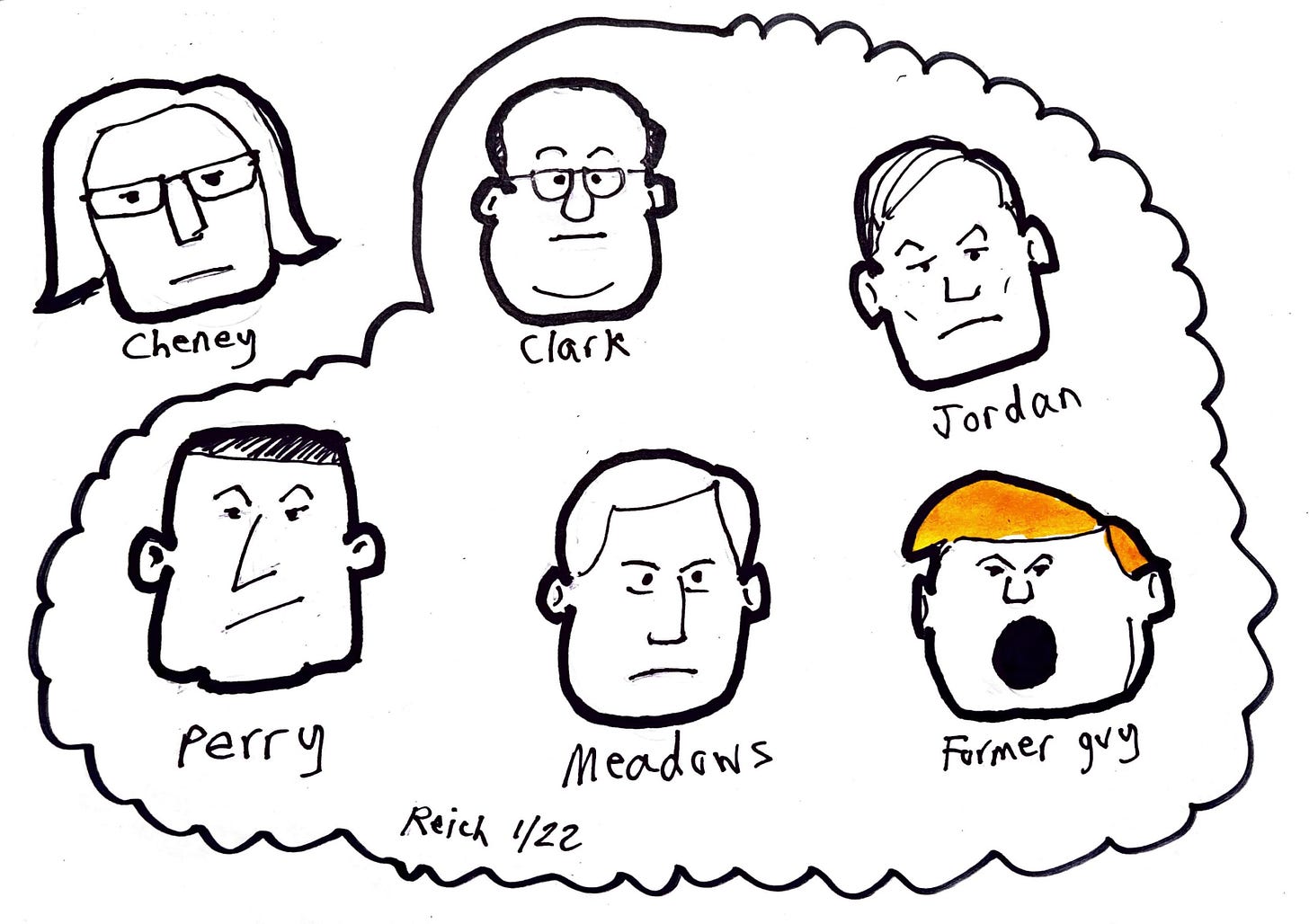Before we turn to what I’m calling the "Potterizing” of America (the consolidation of wealth and power in the hands of a few at the very top), we need to deal with one of its shameful consequences that will be front and center this week: accountability for Trump’s ongoing attempted coup and the January 6 attack on the Capitol. Thursday marks the first anniversary of that attack.
Last Wednesday I discussed four truths underlying the attack: (1) Trump incited it, (2) it culminated two months of his attempted coup, (3) his attempted coup continues to this day, and (4) he and his accomplices must be held accountable -- and we must also respond to the reasons why so many Americans continue to support him and his Big Lie.
As Congress returns and the anniversary of the attack comes into view, the necessity of accountability presents itself in two forms. Democrats can and must act on both.
The first is voting rights. The Senate reconvenes today. Voting rights is the most important issue before it, considering that Republican-dominated states have used Trump’s Big Lie to justify a raft of measures to restrict voting and give their legislatures greater control over the administration of elections. More such measures are on the way.
The Freedom to Vote Act and the John Lewis Voting Rights Enhancement Act, both now before the Senate, are critical to protecting American democracy from these and other incursions. But because no senate Republican supports these bills, they can be passed only if senate Democrats change the filibuster rule. One way (which even Joe Manchin seems receptive to) would be to carve out an exception for voting rights bills so they can be enacted by a simple majority.
Changing the filibuster is the first step to protecting voting rights and our democracy. Senate Democrats must take this step right away.
The other form of accountability is criminal responsibility for the attempted coup and the attack on the Capitol. The Justice Department has already charged more than 700 people with participating in the attack. Although no case has yet gone to trial, many of the defendants have pleaded guilty and received sentences from probation to 41 months in prison.
Yet so far, the Department has charged no political figure, including Trump himself. To be sure, the Watergate scandal didn’t result in significant prosecutions and convictions for two years after the break-in. But if Republicans gain a majority in the House next November, you can bet they’ll close down the House’s January 6 committee now investigating the attack.
The critical political actors at this point are:
Republican congresswoman Liz Cheney, the committee’s vice chair. Cheney is focused squarely on Trump’s potential crimes. Yesterday she said of Trump: “Any man…who would provoke a violent assault on the Capitol to stop the counting of electoral votes, any man who would watch television as police officers were being beaten, as his supporters were invading the Capitol of the United States is clearly unfit for future office, clearly can never be anywhere near the Oval Office ever again.” She went on to warn her Republican colleagues that they “can either be loyal to Donald Trump or we can be loyal to the Constitution, but we cannot be both.”
Mark Meadows, Trump’s last chief of staff. After he failed to appear before the committee, Congress voted to hold him in contempt and referred him to the Justice Department for prosecution. As of today, the grand jury impaneled by the Department has not indicted Meadows (note that his is the same crime for which Trump adviser Steve Bannon was indicted).
Former assistant attorney general Jeffrey Clark. His testimony could also implicate Trump. Recall that when top Justice Department officials told Trump that no widespread fraud contributed to President Joe Biden’s win, Trump reportedly responded, “Just say that the election was corrupt and leave the rest to me” and his allies in Congress. Clark apparently took Trump up on his request, drafting a letter giving Georgia elections officials a road map to overturn the election’s results. When Clark appeared before the House committee about this, he refused to answer questions and has since missed several appearance dates (allegedly because of unspecified health issues).
Republican congressman Scott Perry. He reportedly assisted Trump in trying to install Clark as attorney general. (Perry and Meadows seem to have communicated via encrypted apps, presumably to hide what they were talking about.) Perry has refused the committee’s request for documents and testimony concerning the run-up to the attack on the Capitol, asserting that the committee is an “illegitimate entity.” (Hello? Multiple trial and appellate courts have ruled that the committee is doing precisely what it is authorized to do.)
Republican congressman Jim Jordan. When the Jan. 6 committee announced it was seeking testimony from Jordan about his conversations with Trump on the day of the Capitol attack, Jordan also refused, alleging that the committee “altered” punctuation in a text message Jordan had sent to Meadows urging former Vice President Mike Pence to disregard Electoral College votes Pence deemed unconstitutional. (Rubbish. An allegation of altered punctuation is not a defense against a congressional subpoena.)
Attorney General Merrick Garland. Responsibility for prosecuting Trump falls to Attorney General Merrick Garland. It would be good to know what he’s up to. Is he simply being extra careful in putting together a case against Trump? Is he waiting until the House committee makes its report? Or is he putting a brake on all of this so as not to further enflame Trump supporters?
Trump, meanwhile, has asked the Supreme Court to halt release of his White House records to the House select committee.
But the House committee will forge on.
My friends, the first anniversary of the attack on the Capitol will not be the occasion it should be: a day when the nation comes together to repudiate Trump and his co-conspirators whose treacherous acts led to it. That’s because Trump has divided America with his big lie. A new ABC/Ipsos poll shows that although 65 percent of Americans believe President Joe Biden’s 2020 victory was legitimate, 71 percent of Republicans believe Trump’s false claims that he is the rightful winner. The division in America over Trump’s attempted coup and the attack has no parallel in our nation’s history since the Civil War.
Yet if we do not strengthen voting rights, and if Trump and his accomplices are not held criminally accountable, we are inviting another attempted coup. Next time, it could succeed.
Your thoughts?

















